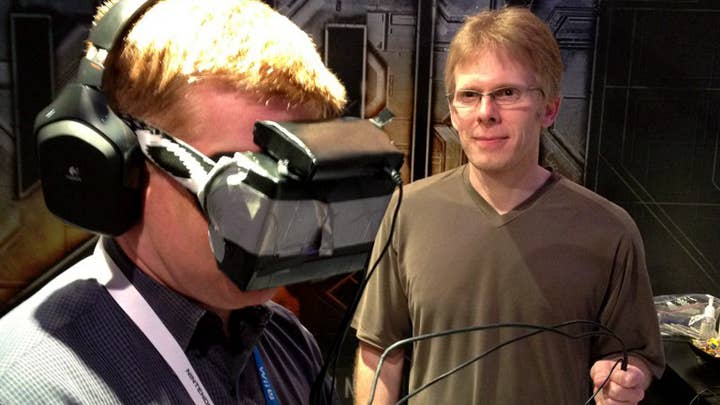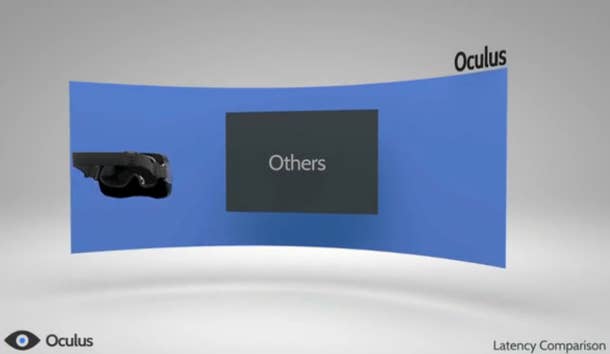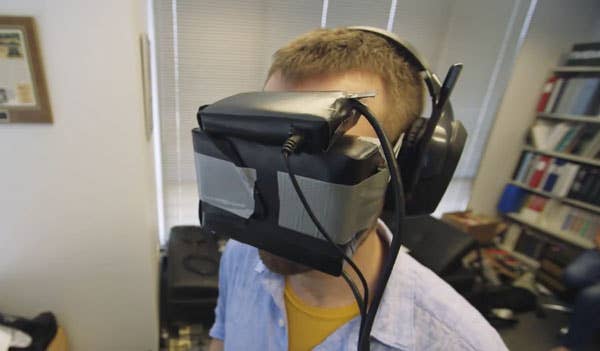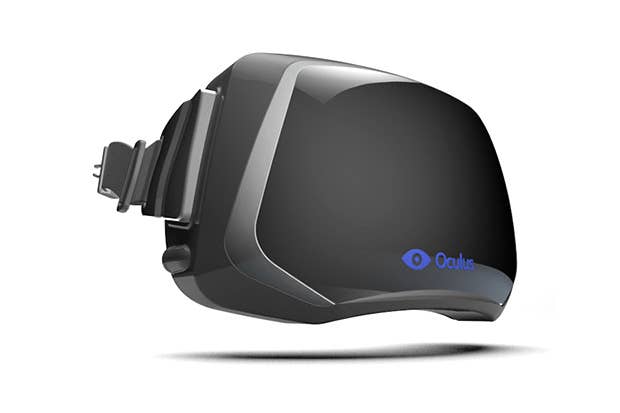Oculus CEO: "This is just gonna change everything"
Brendan Iribe explains how their VR headset is an exciting new platform
One of the demos at E3 that gathered a lot of attention was a new virtual reality (VR) headset being shown by none other than programmer extraordinaire John Carmack. The fluidity and impressive field of view created a compelling illusion of being inside a virtual world, according to those who tried it. The device was not Carmack's creation, though; it was designed by a young engineer named Palmer Lucky, whose startup Oculus has put the Rift VR headset on Kickstarter, where it's already brought in over $2.1 million (with a goal of $250,000 long surpassed).
Oculus has hired Brendan Iribe as CEO; Iribe's past includes founding Scaleform (a middleware vendor) and working for Gaikai as Chief Product Officer. GamesIndustry International caught up with him as the Kickstarter for the Oculus Rift continues to unfold.
I'm a technology engineer at heart. Back in the day, I was a big programmer myself. I'm definitely a geek and it's a seeing-is-believing thing. I describe the first experience I had seeing the prototype - instantly the hairs on the back of my neck stood up. I got so excited because for the first time in my life VR really works. And it works at a consumer level that's going to be approachable and adoptable by everybody. Seeing is believing with this thing, and seeing the prototype and the demo you realize right away that this is possible and that everybody can experience this. And when they do they're going to be just as excited as we were when we tried it.
This has been the story for everybody that we've gone and visited. Palmer went around and met with tons of folks - really high end, high-profile game developers. Some of the most prickly guys, the most skeptical and critical guys out there often are in the game space, and when they see this demo and this prototype they look at it and go "wow, this is going to be a reality, we want to help." It doesn't hurt that Palmer Lucky, the inventor of the hardware, is an incredibly nice guy. He's a true VR enthusiast and a geek like the rest of us. He invented this out of his garage and it has that story to it, and you meet the guy and you realize he's very young and passionate and excited about this. He's easy to want to help, and it's a lot of fun to hang out with him.
When I was originally introduced to him through a mutual friend, my first thought was "VR, really? That just doesn't work, man. Aren't we over that now? It's been thirty years and it hasn't worked." As soon as you see that prototype, for me at least my life changed.
"As soon as you see that prototype, for me at least my life changed"
Brendan Iribe
We can't release too many details now. We're still nailing everything down and we want to make sure that we manage expectations and we don't make any false promises. What we have promised via the Kickstarter is that for a $300 pledge you get the developer kit, which includes the headset, and that will ship in December. Right now we feel very confident we're going to be able to meet that goal. I just came back from China visiting manufacturers and factories. We've selected a manufacturer we're going to use now; they're onboard and they feel very confident they can deliver the first batch of developer kits in the time frame, and at the price point that we're targeting.
If we can deliver very early developer kits in very low quantities - we just crossed 5,000 units and we expect we'll be at 10,00 units for December - if we can do that for $300 a headset, then the consumer kit in much higher volume, with arguably better components and higher quality, shouldn't be much different in terms of a price point. I can't say whether it will be higher or lower, but it 's not going to be much different.
It is, it's something that's really unique. You bring up a good point about the different gaming experience. It can be the same game, and Carmack mentioned this in one of his speeches at QuakeCon. Playing a game in stereo 3D VR is a different experience; you can run through the same level [as you did without VR] and it's a whole new level of immersion and a whole new exciting experience. We've already been talking to a number of game developers who are very excited about being able to go back to some of their recently released games and add a VR mode. It's fairly easy to add an Oculus-ready mode where you can put on a headset and now play that same game in virtual reality.
It will be an exciting time for people to be able to re-release some of these games in VR mode and get another little bump of sales, and have a richer experience with some of the content they've just made that maybe is tapering off in terms of sales. We've already been engaged with several developers that want to ship day and date release of 2D and 3D VR versions of the same title, and that's very exciting. Some of these titles are games that we feel, and the developer feels, will have millions of units sold on release, and they'll come out of the box with a VR mode. We'll be making some of those announcements within the next few months, one perhaps even before the Kickstarter finishing.

In the beginning we're targeting PC games and game developers, but we're also engaged with console developers. We certainly would love to see compatibility of the Oculus headset with consoles; that's going to be largely up to our relationship with console manufacturers. We've got to engage with them and see what their level of interest is. I think as the adoption goes up very quickly on the PC front it would surprise me if consoles didn't get on board. Certainly if you look at where consoles are going with their next-gen this is very well timed. Their next-gen consoles definitely have the horsepower to drive a 60 FPS stereo 3D experience.
I always say it's good to be first. With Scaleform [the middleware firm Iribe founded] people always asked me, what led to Scaleform being one of the fastest adopted pieces of SDK middleware in the game space, and I said "Well, it ws the first UI solution." There wasn't another UI solution, and we were first to market, and we did a really good job with it and with supporting game developers. We quickly ramped up and once you're there it's hard to compete. Looking at the VR side, people will start innovating with these headsets in December and we'll quickly move to the consumer market. We can't give a date but you can expect us to get there as quick as we can. It's not going to be years away, like potentially other larger companies would be.
Getting engaged with developers very early, getting the dev kits in their hands, getting our SDK at the highest quality that we can get it integrated into their games and their game engines today really puts us at the forefront of this. Will game developers want to go and integrate multiple VR SDKs? I don't think so, they didn't want to do that with any other SDK that they use for their games. We believe timing-wise we're at a great place to be pioneering this space. I'm sure competition will come; competition always shows up on any good opportunity, but we will be out there leading the charge.
"This is made possible by the smartphone and tablet world"
Brendan Iribe
Well, we're going to do a lot of good press and marketing; we're certainly going to have to ramp up. It's hard but you have to get in front of the right people with the demo. So when we get in front of press with the demo, and they get to try the prototype, and we go and we visit those select game developers, as soon as you put this thing on your head and look around you get the potential of where this can go. You want to get involved, and you want to help, and hopefully write something positive about it. Part of the Kickstarter is to start that kind of viral marketing. When we ship 10,000 developer kits in December there'll be an awful lot of people at a lot of different game studios and a lot of different developers that start talking about Oculus. For us, marketing is more a matter of getting all the developers to support it. As they start to promote that the game is compatible with Oculus it will drive a lot of interest.
Absolutely. It's pretty cool that a number of those tool companies like Autodesk do make tools for both markets; they follow the video game market very closely because they make the leading tools for that space. They provide tools for the movie space too. Getting out in front and showing consumers and developers the experience you can have in VR will quickly trickle onto other verticals. We've already seen a lot of people reaching out on the Kickstarter from other markets. There's a large number of other developers jumping in.
This is made possible by the smartphone and tablet world. Apple and Google are out there driving incredible adoption of their very high-resolution, low-cost small displays, with six axis sensors, which is exactly what we need for this. They're making hundreds of millions of cellphones and tablets with those same components in them; for us to latch on and make a headset which has similar components, we're able to benefit from the adoption and mass manufacturing that they've been causing to really make an affordable headset. To get a VR experience that's 60 FPS and stereo 3D to really be rich and instant and no lag, to feel as though your head is the camera and you're in this virtual world, to make that a reality you need a good computer. You're now at 60 FPS stereo 3D; this isn't that easy. It does take a lot to render at a photo-real level. But that's where we are today, computers are capable of this. I think you'll see companies like Intel and Nvidia getting really excited about this because it just helps further drive for the demand and need for high-performance computing which they're so good at.

Absolutely. We think there will be a big retail component to this. We are looking into that and into those relationships. It's all moving very quickly, because it's only been a few weeks since I've been involved. I think you'll see retail playing a big part of how people can experience it and try it before they buy it. The viral word-spreading really drives a lot of the market. When one kid buys a Rift and says "Oh my God it's the most amazing thing ever" and his friends go over to his house and they put it on and they go home and say "Mom, I have to have a Rift, Johnny has it and it's totally incredible, that's what I want for Christmas" then it'll just start spreading quickly.
Yes. This is very much a new platform. This is more a new platform than almost anything we've seen before. Maybe you can look at the iPhone and iPad as a new platform because of the touch interface and the touch screen, portability aspects of it, but looking at VR and Oculus headsets it's such a new experience that drives and demands exclusive VR content. Games that are made specifically for that new experience, that new platform are going to be the best; that's the same for any new platform. A bunch of game developers said "We're ramping up to do launches in the next several months to a year, and out of the box we want that game to ship in 2D TV mode and VR mode, compatible, same-day launch."
Some game developers we've been talking to are starting to get their head around, and are having a hard time sleeping, thinking about what they can do as game designers. I can't mention any names yet but certainly I'm very excited to reach out and get in touch with guys like Cliffy B, where they're not the lead programmers but they're the lead designers. When we met up and he saw the demo, I think you can see from the Kickstarter endorsement he obviously is pretty excited about it. Just kicking back and forth ideas, a guy like that is so creative he comes up with some really cool potential experiences that are only made possible because of VR.

There are so many things you can do that are pretty wild. Carmack was saying that there are parts of a game where in 2D you just run by and you don't really look at anything; you're just blasting away at monsters. When you put on this VR headset, suddenly as you're walking around the world there are a lot of things you just want to turn and stare at. In one of the demos there's a broken brick wall with rubble, and it's kind of fun to get up close and look at this rubble. I think you'll see game designers taking advantage of this new VR world to drive experiences that we can't even imagine now, whether it's flying, or finding different things in the world, there's going to be a lot of cool new things that people create that I'm excited to play with and experience myself.
Certainly, that's one of the key points of this; when you put the headset on the world is gone. You don't see it, there's no light anywhere, you go completely dark and the screen comes on and you get this incredibly wide field of view which puts you in the [game] world. When you feel like you're in it, horror games and games that surprise you are incredibly engaging. We're envisioning people having these headsets on and ripping them off and panicking and being like, " can't take it any more!" then looking at their headset and saying "I must have more, I'm gonna put it back on." That level of immersion is going to change the game space.
"This is very much a new platform"
Brendan Iribe
Absolutely. We're definitely looking at how we can work with different audio companies to get a full 3D audio experience in this. Right now we're focused on the headset, but we'd love to have different peripherals whether they're wands that you can wave around and do motion tracking, or 3D audio... anything that's going to increase that level of immersion. Ultimately the goal is to feel like you're right in that Star Wars environment with your light saber, hear someone coming and instantly turn around and swipe your weapon and really feel like you're right there in it. I think we'll get there very quickly, actually.
When we hear about next-gen consoles, "They're gonna be 6 or 7 times faster" - great, another faster console. It's gonna be amazing, it'll have some better looking graphics, some better physics and more realistic AI, but what is that new experience? What's that new sensation that you play with and go "Oh my god, this is incredible." Microsoft is driving a lot of really cool innovation around Kinect, and that is bringing a new dimension to things. For me, when I tried Kinect, the hair on the back of my neck didn't stand up. I thought, "This is cool, this will go somewhere, it's kind of neat."
When I put on the prototype of Rift, and I looked into the VR world, and I'm moving my head around, it's perfectly tracking and I'm in this 3D world, that's when I said "Oh my god, this is incredible, this is just gonna change everything." I want to play my favorite games; I want to play Crysis and Call of Duty and Battlefield and Gears of War and Hawken. I want to play these games which are so incredible, and I want to play them in VR where I can feel like I'm in the game. Like you said, this is really going to create a lot of excitement in the game space. You don't get somebody like Gabe Newell or Michael Abrash or John Carmack excited about too many things, and when you do you should definitely pay attention.

